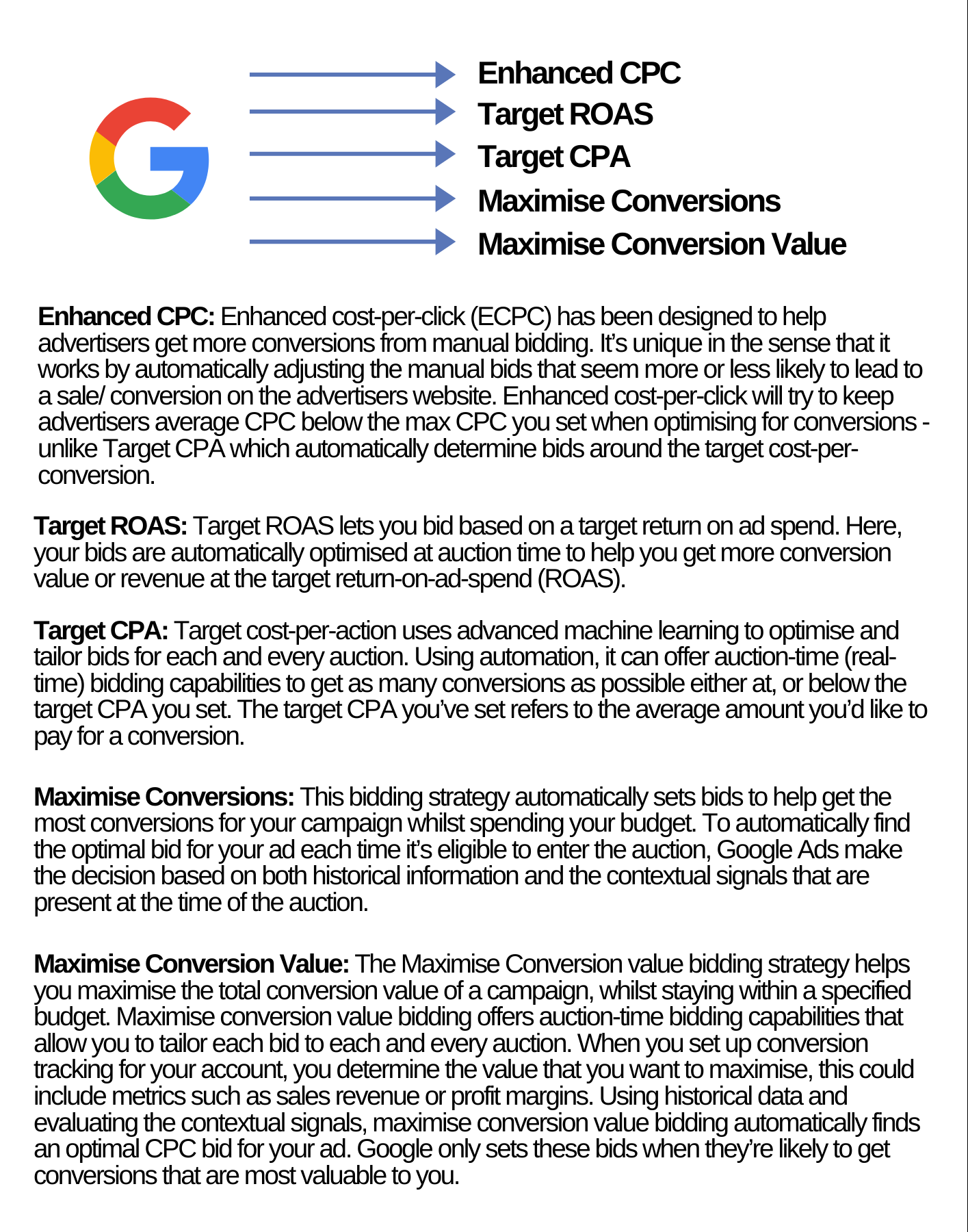Smart Bidding is a set of conversion-based bid strategies that make use of machine learning to optimise your bids when they enter the auction. It takes into account a huge range of signals to make sure each bid is tailored to maximise on both conversions and conversion value.
Smart Bidding strategies include:

There are so many benefits to using Smart Bidding and as a leading PPC agency, we’ve quickly learnt that it’s no longer optional. If you want your Google Ads to deliver the best results, you need to get to grips with it.
Smart Bidding isn’t the future, it’s happening right now, and here’s why you need to get on board…
1 – Access To More Signals
Machine learning algorithms can analyse up to 70,000,000 signals, and so advertisers using Smart Bidding have access to a much wider range of information about their target audiences.
Signals are what makes it easier for advertisers to target their ideal customer, as they cover a range of attributes and characteristics about a person and their situation at the time of a particular auction.
If you’re an existing advertiser you’ll know that certain signals are available as manual bid adjustments, such as device type and location; however, advertisers using Smart Bidding have access to a far larger range of attributes.
Signals available to Smart Bidding advertisers include:
- Device
- Physical location
- Location intent
- Day of week and time of day
- Remarketing list
- Ad characteristics
- Interface language
- Browser
- Operating system
- Demographics (Search and Display)
- Actual search query (Search and Shopping)
- Search Network partner (Search only)
- Web placement (Display only)
- Site behaviour (Display only)
- Product attributes (Shopping only)
- Mobile app ratings (coming soon)
- Price competitiveness (coming soon for Shopping)
- Seasonality (coming soon for Shopping)
Having access to more signals essentially means the advertiser has more information about the target customer. This, therefore, allows advertisers using Smart Bidding to accurately tailor bids, provide more relevant ads and dedicate ad spend to the right areas.
2 – Reduced Opportunity For Human Error
Human error.
Definition: A person’s mistake rather than the failure of a machine.
The definition of human error even includes the word ‘machine’, making it somewhat obvious that Smart Bidding, a strategy centralised around machine learning, reduces the opportunity for human error.
The problem with our human way of managing bids and optimising accounts based on the targets our clients give us, is that we can do too much. Let’s use a scenario for context; performance in an account has been struggling for a few weeks so you tweak the bids. But then if the performance still hasn’t picked up a week later, you may be tempted to do some more bid adjustments. Days later, you’re panicking, wondering why your changes have had an impact and you realise you actually should’ve done long-term bid management, so you make even more changes.
This desire to make these changes and improve an account comes from a good place, but it can be too much, too often. The flip side of this is to trust Google’s machine learning algorithms that can analyse up to 70,000,000 signals within 100 milliseconds, as opposed to the limited data we as humans have available to us.
Furthermore, we’re prone to simple things like making a bid adjustment change on a device go to +50 when it should’ve been +5, thus spending way more than you intended to. Or you could miss one single keyword bid that needed pulling down, and it continues to spend even though you should’ve taken it down. Even worse, you could get your filters mixed up when performing bid management and end up increasing and decreasing the completely wrong bids. Okay, it’s highly unlikely, but eliminating the chance of human error brings peace of mind.
It’s important to note that we’re not saying Smart Bidding eliminates human error, but it most certainly reduces the chance for it.
3 – Real-Time Bidding
A key difference between Smart Bidding and Manual Bidding is that Smart Bidding offers automated, real-time bidding.
Manual Bidding involves human intuition. It means managing your bids based on situations that have already taken place, making bid increases or decreases based on past performance and not being reliant on automated solutions. Not only does this leave huge room for mistakes, but manual bidding can be extremely time-consuming.
Smart Bidding, on the other hand, uses machine learning to automatically select the most optimal bids. It offers an automated, real-time way for advertisers to ensure their bids are fully optimised to achieve the highest conversions. Instead of manually adjusting each and every bid, advertisers can now tell the machine which metrics are most important, and Smart Bidding will make sure each ad is best optimised to achieve that when entering the auction.
4 – Continuous Improvement
Smart Bidding is constantly learning. Unlike a human, a machine can’t max out their knowledge. Humans can only learn so much about an audience, especially with the limitations of manual bidding. With Smart Bidding always looking to improve it means ads can only get more tailored, more relevant and therefore more profitable.
Not only does continuous machine learning improve the performance of ads, but for account managers, creates time for other optimisation and deeper levels of account management. Instead of spending time on manual bidding trying to craft the perfect ad, Smart Bidding takes care of that, leaving account managers more time to focus on strategy and adding value to other areas of the account.
If you’re an independent advertiser and you’ve not given it a go yet, then hopefully this blog inspires you to try it out; and, if you’re advertising through an agency, now’s the time to double-check that Smart Bidding is being used within your account.
Tags:
February 11, 2020